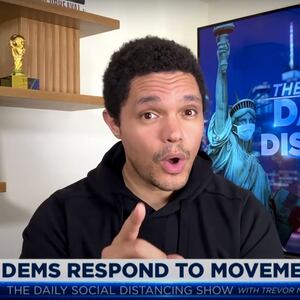Congress’ first hearing about police brutality in the wake of George Floyd’s murder was marked by raw and emotional testimony from his brother and some well-meaning words from members of both parties about working together to reform law enforcement in the U.S.
"The people elected you to speak for them, to make positive change. George’s name means something. You have the opportunity here to make your names mean something, too,” said Floyd’s brother, Philonise, in his opening remarks. Later, weeping, he said "Justice has to be served. Those officers, they have to be convicted… His life mattered. All our lives matter. Black lives matter. I just wish I could get him back."
But despite Floyd’s appeal, much of the House Judiciary Committee’s lengthy hearing on Wednesday was overshadowed by a proposal that Congress isn’t seriously considering, or even has the power to do: defunding the police.
Over the last week, those protesting police brutality have injected the idea of dramatically reducing police funding into the national debate about law enforcement. President Trump and his supporters have seized on the idea as a tool to attack Democrats and needle the party’s politicians over whether they support the radical proposal.
The top Republican on the committee, Rep. Jim Jordan (R-OH), began his remarks in the Judiciary hearing by saying the death of George Floyd “never should have happened” but then went off on those advocating to defund the police. His rant was echoed by nearly all of his Republican colleagues on the committee—and tweeted approvingly by the president—making it clear that, for some, this was as much an opportunity to score political points as anything else. Rep. Matt Gaetz (R-FL) asked all the witnesses to raise their hand if they supported defunding the police, while Rep. Debbie Lesko (R-AZ) used her remarks to read tweets from progressives who have said favorable things about it.
“Those on the left can try to minimize this,” said Rep. Guy Reshcenthaler (R-PA). “I think that if anything, the murder of George Floyd demonstrates the need to invest more in our police departments.”
One GOP-called witness, Pastor Darrell Scott, an advisor to President Trump’s campaign, spent nearly his entire opening remarks warning about defunding the police, saying it would lead to “domestic terrorism, mob rule, gang rule, vigilantism.” Another GOP witness, former cop and conservative pundit Dan Bongino, was invited by lawmakers multiple times to tee off on defunding the police.
The idea’s popularity, however, is limited to the most left-wing corners of the Democratic Party: Reps. Ilhan Omar (D-MN) and Alexandria Ocasio-Cortez (D-NY), for example, have backed it, and the very left-leaning governments in cities like Minneapolis are exploring the idea.
But in Washington, Democratic leaders have dismissed it as a distraction—the party’s presidential nominee, Joe Biden, has voiced support for more funding for police—and the idea is nowhere in Democrats’ police reform legislation that was introduced on Monday.
The relentless focus from Republicans on Wednesday on an issue that’s certain to go nowhere at the federal level obscured one of the more remarkable developments in Washington over the last week: that both parties have a good deal of common ground on police reforms.
Floyd’s death, and the protests it sparked, have fomented a moment where Republicans are talking about the need to rein in police and considering proposals to reform them—a sight that would have been far-fetched even a few years ago. The day after Democrats introduced their bill, Republicans quickly got to work on a proposal of their own, which is being led by Sen. Tim Scott (R-SC). The path for a bipartisan compromise doesn’t seem totally unlikely.
Indeed, on Wednesday, GOP witnesses and lawmakers expressed support for several of the ideas Democrats have put forth in their package: creating a national database of cops with histories of misconduct, ending the style of chokehold that killed Floyd, and—even among some Republicans—loosening liability protections that make it harder for people to sue police for damages.
Gaetz, for example, told the sponsor of that bill—Rep. Karen Bass (D-CA)—that Republicans stand ready to work with her on the legislation. Rep. Kelly Armstrong (R-ND) made a similar point, telling Democrats they can and should work together on police reform and even additional measures aimed at the criminal justice system’s disparate impact on people of color.
Against that backdrop, Democratic lawmakers seemed largely content to ignore the frequent GOP refrains on defunding the police. There were few direct or even indirect rebukes from the majority: Rep. Zoe Lofgren (D-CA), for example, gently pointed out that "it is the local communities that organize their public safety response, not the federal government.”
But Wednesday’s hearing wasn’t solely filled with paeans to bipartisanship, powerful testimony from those affected by violence, and trial runs of election-season attacks. There were some genuine fireworks between the two sides that indicated the deep divisions that do exist on issues of race and policing.
Rep. Hakeem Jeffries (D-NY), the chair of the Democratic Caucus, needled Bongino by listing examples of armed white men—like the 2012 Colorado shooter James Holmes—who were taken alive by police, a stark contrast to unarmed black men like Floyd who have died by police hands. “I don’t know why you’re bringing this up,” said Bongino.
“Because black lives matter,” Jeffries fired back. “All lives matter, sir,” interjected Bongino.






